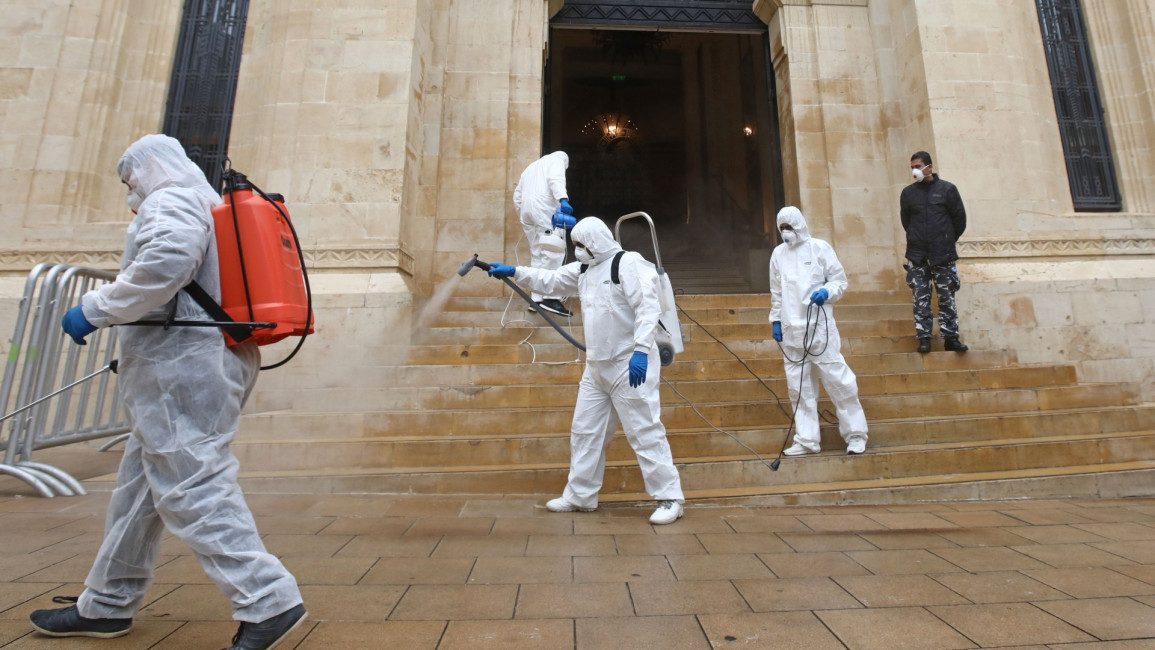Lebanon hospitals 'discriminating against' undocumented workers seeking vital coronavirus testing
Lebanon hospitals 'discriminating against' undocumented workers seeking vital coronavirus testing
Hospitals at the forefront of Lebanon's fight against the novel coronavirus are reportedly failing to provide affordable testing to undocumented migrants.
3 min read
Lebanon is on nationwide lockdown to prevent the spread of the coronavirus [Getty]
Undocumented migrant workers in Lebanon are afraid for their wellbeing during the coronavirus pandemic as they are unable to access affordable healthcare.
Lebanese hospitals at the centre of the fight against the novel coronavirus have turned away undocumented migrants in need of treatment, while others are charging extortionate fees for COVID-19 testing, Al-Jazeera reported.
Two formeR domestic workers of Ethiopian origin told Al-Jazeera they were turned away after requesting coronavirus testing at Beirut's Rafik Hariri University Hospital (RHUH), the main COVID-19 testing and treatment centre in the country.
Both said they were turned away due to their lack of identification documents.
A source at RHUH said it was the hospital's policy to turn away anyone without documents if they did not need urgent care.
"We must provide the state with the name of any person who we test, so that if it is positive we can inform both the state and the person. We can't do that without a name," the source said.
"To be very clear, anyone who comes to us in an emergency condition and needs treatment will be given treatment, but if they are not an emergency case we can't," the hospital source added.
Another hospital in the capital is charging undocumented workers for testing at a prohibitively high cost.
A worker at the St George Hospital told Al-Jazeera undocumented people would need to pay 750,000 Lebanese pounds (about $498) for coronavirus testing.
Some private clinics have paid the test available for the cost of 150,000 Lebanese pounds (about $99).
|
|
An estimated 250,000 domestic workers from Africa and Asia live in Lebanon, most of whom earned between $150 to $250 a month before the country slid further into economic crisis last year.
The depreciation of the Lebanese currency has seen the value of these wages slashed, while some employees have taken the opportunity to either pay domestic workers late or not at all.
Under Lebanon's notorious kafala system, domestic workers cannot leave their job without their employer's consent.
Many work under difficult and oppresive conditions, forcing some to flee and effectively become illegal residents in the country.
Tenteb, a former domestic worker who has lived in the country for 10 years, told Al-Jazeera she lost her job in March after developing coronavirus symptoms.
She immediately sought testing for the virus but was turned back by RHUH employees and left to self-medicate with antibiotics, vitamins and paracetemol.
"I got very scared, because I am living in a three-room apartment with 14 people, all of them former domestic workers who either ran away from abusive employers or were laid off during Lebanon's economic crisis," she said, adding that none of her roommates had developed symptoms yet.
Rosa, a 29-year-old Ethiopian, said: "How will Lebanon control this virus if they do this? This is more important than anything: documents, nationality, black or white. We all live here together in Lebanon. I don't know how they think."
Healthcare should be "available and accessible to everyone without discrimination", added Diala Haider, a Lebanon campaigner at Amnesty International.
Lebanon has reported 438 confirmed COVID-19 cases, including 10 fatalities.
Follow us on Facebook, Twitter and Instagram to stay connected



